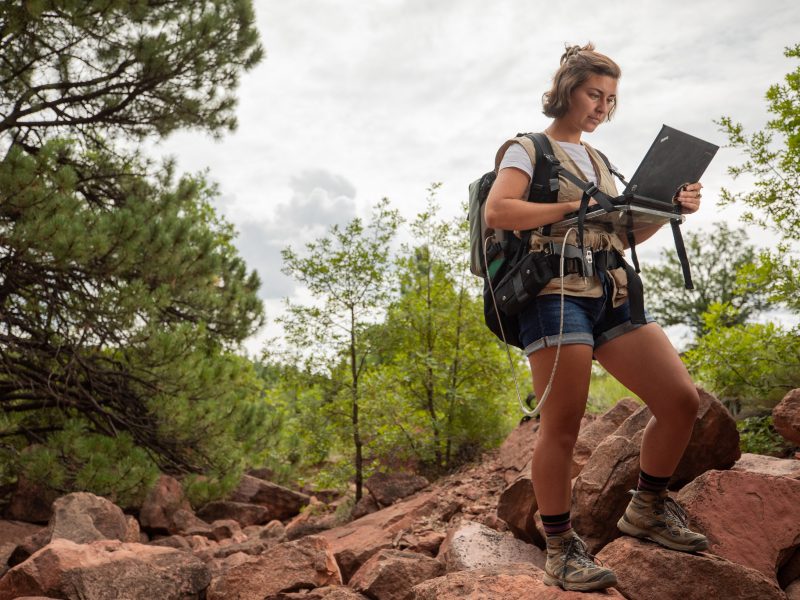Empowering you to study environmental health

The purpose of RISE (Research Initiative for Scientific Enhancement) funding is to support research activities that enhance the diversity of the biomedical, behavioral, and clinical research workforce. To this end, Northern Arizona University proposes to increase the number of Native American and other underrepresented scientists prepared to enter PhDs in STEM fields related to environmental health. This program uses the drivers of culturally relevant support, hands-on research experiences, and a tailored curriculum to help students progress through bachelor’s, master’s, and doctoral degrees. Read more at:
Program benefits
Bachelor’s students
Bachelor’s students work with a faculty mentor. Benefits include:
- hourly student wage
- support for travel to conferences
- research funds
- intensive training outside the lab and career development through a targeted curriculum and workshops
Master’s students
Master’s students work with a faculty mentor. Benefits include:
- stipend
- tuition and health benefits during the academic year and summer term
Eligible students
At the time of application, students will meet the following guidelines:
- GPA of 3.0 or higher
- incoming junior or senior by the fall of the application year, or any qualified student wishing to apply as a first-year MS student
- citizens or non-citizen nationals of the United States or lawfully admitted US permanent residents
- planning to be enrolled as full-time students at NAU during the period of their RISE program
- must be from one of the NIH-defined underrepresented groups in the US Biomedical, Clinical, Behavioral and Social Sciences Research Enterprise:
- Black or African American, Hispanic or Latino, American Indian or Alaska Native, Native Hawaiian and other Pacific Islanders
- individuals with disabilities
- individuals from disadvantaged backgrounds
How to apply
Eligible students can fill out our online application. You will need to prepare your personal information, a 500-word statement of interest, two references, and your preferred program mentors. Find more information on the application page.
- Master’s student application deadline: January 15
- Bachelor’s student application deadline: April 1
Program mentors
| Anita Antoninka | PhD, Program coordinator | Soil ecology and dryland restoration, implications for ecological and human health |
| Julie Baldwin | PhD, Health Sciences | Working towards reducing substance abuse and obesity for healthier Native American youth |
| Bridget Barker | Associate Professor, Biology | Dr. Barker focuses her research on the intersection of genomics and epidemiology of environmentally acquired infectious diseases, such as Valley Fever and other fungal infections |
| Matthew Bowker | PhD, School of Forestry | Linkages between ecosystem and human health |
| Emily Cope | Assistant Professor of Biology and Assistant Director of NAU’s Pathogen Microbiome Institute | The roles of microbiota in chronic illnesses, many with links to environmental health |
| Dirk de Heer | PhD, MPH | Health Sciences: Improving health through prevention of chronic diseases and metabolic disorders among Native Americans |
| Catrin Edgley | PhD, School of Forestry | Human impacts of fire |
| Peter Fulé | Regent's Professor, School of Forestry | Linkages between ecosystem and human health |
| John Georgas | PhD, Informatics, Computing, and Cyber Systems | Reducing distances to improve Native American access to healthcare |
| Jani Ingram | PhD, Department of Chemistry and Biochemistry | Environmental contamination from exposure pathways through Native American food and water resources |
| Robert Kellar | PhD, Center for Bioengineering Innovation (CBI) | Influence of environmental contamination on wound healing |
| Naomi Lee | Assistant Professor, Department of Chemistry and Biochemistry | Vaccine development towards chronic and infectious diseases to improve the health of Native American communities |
| Erika Nowak | PhD; School of Earth and Sustainability and Department of Biological Sciences, Center for Adaptive Western Landscapes | Education-based prevention of venomous snakebite; conservation of threatened herpetofauna affected by human-transmitted pathogens |
| Catherine Propper | PhD, Biological Sciences | Environmental contaminants influence physiological and behavioral outcomes in vertebrates and the implications of these exposures for biodiversity and human health |
| Matthew Salanga | PhD, Biological Sciences | Effect of environmental contaminants on development and cancer |
| Priscilla Sanderson | PhD, CRC, Health Sciences | Navajo Nation Healthy Diné Act: An implementation study |
| Marc Tollis | PhD, Informatics, Computing, and Cyber Systems | Comparative genomics of vertebrates and cancer across the tree of life |
| Tinna Traustadóttir | PhD, Biological Sciences | Redox biology of aging |
